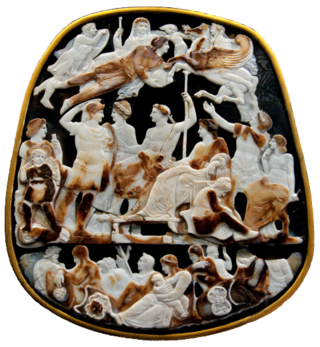Related Research Articles

The Julio-Claudian dynasty comprised the first five Roman emperors: Augustus, Tiberius, Caligula, Claudius, and Nero.

Antonia the Elder was a niece of the first Roman emperor, Augustus, being the eldest daughter of Octavia the Younger and her second husband, the Triumvir Mark Antony. She married Lucius Domitius Ahenobarbus and became the paternal grandmother of the emperor Nero.

The gens Julia was one of the most prominent patrician families in ancient Rome. Members of the gens attained the highest dignities of the state in the earliest times of the Republic. The first of the family to obtain the consulship was Gaius Julius Iulus in 489 BC. The gens is perhaps best known, however, for Gaius Julius Caesar, the dictator and grand uncle of the emperor Augustus, through whom the name was passed to the so-called Julio-Claudian dynasty of the first century AD. The nomen Julius became very common in imperial times, as the descendants of persons enrolled as citizens under the early emperors began to make their mark in history.
Decimus Junius Silanus Torquatus was a Roman senator who lived during the 1st century.

Vipsania Agrippina was the first wife of the Emperor Tiberius. She was the daughter of Marcus Vipsanius Agrippa and Attica, thus being a granddaughter of Titus Pomponius Atticus, the best friend of Cicero.

Gnaeus Domitius Ahenobarbus was a member of the imperial Julio-Claudian dynasty of Ancient Rome. Domitius was the son of Antonia Major. He married Agrippina the Younger and became the father of the emperor Nero.
Sextus Appuleius is the name of four figures during the 1st century BC and 1st century AD. The first Sextus Appuleius was married to Octavia Major, the elder half-sister of Augustus. The three subsequent figures named Sextus Appuleius are respectively the son, grandson and great-grandson of Sextus Appuleius (I) and Octavia Major.
Quintus Haterius Antoninus or known as Antoninus was a Roman senator, who was active during the reign of Claudius and Nero.
Lucius Aemilius Paullus was the son of Paullus Aemilius Lepidus and Cornelia, the elder daughter of Scribonia. He was married to Julia the Younger, the eldest granddaughter of the Emperor Augustus.
Quintus Aelius Tubero was a Roman senator. He was one of the priestly quindecimviri sacris faciundis who oversaw the celebration of the Saecular Games in 17 BC. He held the office of consul in 11 BC with Paullus Fabius Maximus. Rüpke and Glock date his appointment to the College of Priests about 21 BC.
Quintus Junius Blaesus was a Roman politician who lived during the reigns of Augustus and Tiberius. He was the maternal uncle of Lucius Aelius Sejanus, the Praetorian Prefect of Emperor Tiberius.
Fabia Numantina was a member of the patrician Fabia gens. Precisely how she fits into this family is not certain; while she is generally believed to be the daughter of Paullus Fabius Maximus and Marcia, a maternal first cousin of Augustus, it is possible that she was the daughter of Paullus' brother, Africanus Fabius Maximus.

Paullus Fabius Maximus was a Roman senator, active toward the end of the first century BC. He was consul in 11 BC as the colleague of Quintus Aelius Tubero, and a confidant of emperor Augustus.
Marcus Livius Drusus Libo was an ancient Roman consul of the early Roman Empire. He was the son of Lucius Scribonius Libo and adopted brother of the empress Livia. His natural paternal aunt was Scribonia, the second wife of Augustus, as a consequence of which he was a maternal first cousin of Julia the Elder.
Marcus Junius Silanus Torquatus was a Roman senator. He was consul in AD 19, with Lucius Norbanus Balbus as his colleague.

Lucius Marcius Philippus was a Roman politician who was elected suffect consul in 38 BC. He was step-brother to the future emperor Augustus, as well as his uncle
Africanus Fabius Maximus was a Roman senator. His elder brother was Paullus Fabius Maximus and his sister was Fabia Paullina, who married Marcus Titius.

Lucius Calpurnius Piso was a Roman senator active in the first century AD. During the Year of Four Emperors he was governor of Africa and supported Vitellius. After the death of Vitellius he was killed by supporters of Vespasian.
References
- Braund, D.; Augustus to Nero: A Source Book on Roman History 31 BC-AD 68 (Taylor & Francis, 1985) ISBN 0-7099-3206-5, ISBN 978-0-7099-3206-2
- L'Année Epigraphique (AE)
- Stevenson, G., Power and Place: Temple and Identity in the Book of Revelation (Walter de Gruyter, 2001)
- Syme, Ronald; Augustan Aristocracy (Oxford University Press, 1989). ISBN 0-19-814731-7, ISBN 978-0-19-814731-2
- Seneca the Younger, De Beneficiis (On Benefits)